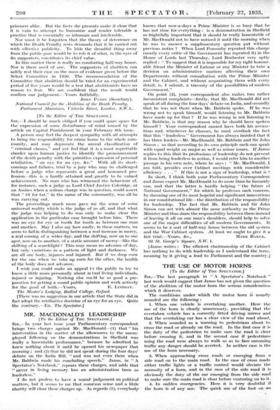MR. MACDONALD'S LEADERSHIP
[To the Editor of THE SPECTATOR.] SIR,—In your last issue your Parliamentary correspondent brings two charges against Mr. MacDonald—(1) that " his inteivention in the matter of -the allowances to the unem- ployed following on the demonstrations in -Sheffield was really a lamentable performance," because he admitted he knew nothing about it until he opened his newspaper that morning ; and (2) that he did not speak during the four days' debate on the India Bill, "and was not even there when Mr.- Baldwin made his concluding speech." Janus, in "A' Spectator's Notebook," repeats these charges, and adds that " neVer in living memory has an administration been so leaderless."
I do not profess to have a sound judgement on political matters, but it seems to me that common sense and a little charity will clear these charges up. As regards (1), everybody'-
knows that now-a-days a Prime Minister is so busy that he has not time for everything : is a demonstration in Sheffield so frightfully important that it should be really lamentable of Mr. MacDonald not to have noticed it until the morning when he was to answer a supplementary question put without- previous notice ? When Lord Ponsonby repeated this charge (nearly every critic of the Government has repeated it) in the House of Lords last Thursday, Lord Rochester very aptly
replied : To suggest that it is impossible for my right honour- able friend the Minister of Labour or any Minister to take a decision on administrative matters affecting their own Departments without consultation with the Prime Minister - and the Cabinet, and without acquainting them with every detail, is, I submit, a travesty of the possibilities of modern Government."
On point (2), your correspondent also makes two rather inconsistent complaints—firstly, that Mr. MacDonald did not speak at all during the four days' debate on India, and secondly that he was not there when Mr. Baldwin spoke. If he was wrong not to speak himself, would listening to Mr. Baldwin have made up for that ? If he was wrong in not listening to Mr. Baldwin, is that any reason why he should have spoken himself ? Your correspondent cannot have both his accusa- tions and, whichever he chooses, he must overlook the fact that this " leaderless " Government has always insisted that it has three leaders—Mr. MacDonald, Mr. Baldwin and Sir John Simon ; so that according to its own principle each can speak with equal weight on major as well as minor issues. If Janus replies to this that its professions of leadership do not prevent it from being leaderless in action, I would refer him to another passage in his own note, where he says : "Mr. MacDonald, I am told, presides over Cabinet meetings with considerable efficiency . . . " If this is not a sign of leadership, what is ?
In short, I think both your Parliamentary Correspondent and Janus expect Mr. MacDonald to do more than he humanly can, and that the latter is hardly helping "the future of National Government," for,which he professes such concern, by damning one of its most hopeful and significant innovations in our constitutional life—the distribution of the responsibility for leadership. The fact that Mr. Baldwin and Sir John Simon can act with almost the same authority as the Prime Minister and thus share the responsibility between them instead of leaving it all on one man's shoulders, should help to solve one of the major difficulties of all modern Governments. It seems to be a sort of half-way house between the old system and the War Cabinet system. At least we ought to give it a
fair trial.—Yours, &c., MARK BAKER. 92 St. George's Square, S.W.1.
[Janus writes : The efficient chairmanship of the Cabinet has nothing to do with leadership as I understand the term, meaning by it giving a lead to Parliament and the country.]


















































 Previous page
Previous page